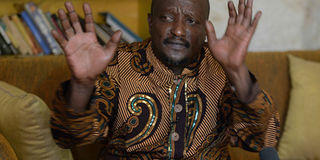Binyavanga Wainaina was not afraid to court controversy

Kenyan author Binyavanga Wainaina gestures during an interview with the AFP on January 27, 2014, in Nairobi. PHOTO | AFP
What you need to know:
- For 17 years, Binyavanga’s name has featured predominantly in the newsreel, for his literary finesse and controversy alike.
- His death from a stroke in Nairobi on Tuesday night brought down the curtains on not just a highly fruitful career in writing but also on his social activism.
Before 2002, the name Binyavanga Wainaina was virtually unknown outside literary circles.
But when his short story “Discovering Home” clinched the coveted Caine Prize for African Writing that year, the author and satirist became a cultural icon celebrated the world over.
For 17 years, Binyavanga’s name has featured predominantly in the newsreel, for his literary finesse and controversy alike.
His death from a stroke in Nairobi on Tuesday night brought down the curtains on not just a highly fruitful career in writing but also on his social activism.
Born in Nakuru County in 1971, Binyavanga studied at Mang’u High School and Lenana School in Nairobi. He later joined the University of Nairobi for a degree in education.
After leaving South Africa’s University of Transkei, where he was studying commerce, Binyavanga freelanced as a food and travel writer for various magazines. His work has also been published by the Guardian, the New York Times and National Geographic.
He founded Kwani? in 2003 as a platform to nurture young East African writers.
He had also featured on the list of TIME’s 100 most influential people in the world in 2014. As his scope of influence grew, the World Economic Forum recognised him as a Young Global Leader in 2007, an award he turned down, saying:
“Although, like many, I go to sleep at night fantasising about fame, fortune and credibility, the thing that is most valuable in my trade is to try, all the time, to keep myself loose, independent and creative … it would be an act of great fraudulence for me to accept the trite idea that I am ‘going to significantly impact world affairs.’”
In 2014, when a heavy tide of anti-gay laws was sweeping across the continent, with most African countries passing legislation that clamped down on homosexuality, Binyavanga announced that he was gay himself.
This revelation, from a renowned writer, set in motion a sociocultural whirlwind, with the writer at the centre of it.
By coming out, Binyavanga had opened a can of worms and generated a divisive debate on what has always been regarded as a taboo subject in the African context.
He published the revelations in a stormy memoir, I Am a Homosexual, Mum, describing it as “a lost chapter” from his earlier novel One Day I will Write about this Place. From this moment on, Binyavanga emerged as a battle-hardened LGBT activist.
Born a decade after independence, Binyavanga belonged to a generation of writers from the continent who successfully alienated themselves from the narratives of the struggle for self-rule, historical and cultural conflicts that have often defined works by the older writers, including Ngugi wa Thiong’o and Grace Ogot.
He is credited with promoting a new dimension of African writing, through his essay “How to Write about Africa”.
His work bore a bare-knuckled approach to sociocultural issues, as Binyavanga sought to debunk the skewed perceptions and portrayal of Africa by the Western world.
Because of this, many literary critics have described him as one of the finest writers of his generation, although his scribal talent that anchored the country on the global literary map has always competed with his activism on LGBT issues.
Mourning Binyavanga’s death, researcher and author Joyce Nyairo described him as a “child of luck who beckoned opportunities like a magnet”.
“Binya leaves an indelible footprint in the sands of that surge of creativity and production that defined Kenya in the new millennium,” Nyairo said in a tweet. “What immense talent; what an enormous personality.”
For three weeks in 2015, the author was admitted to Karen Hospital’s ICU after suffering a stroke that impaired his speech.
In June 2016, Binyavanga narrated in a Facebook post how, after a scuffle, a taxi driver in Berlin assaulted him as his neighbours watched without intervening.
“I feel black, dirty,” he wrote.
During World AIDS Day celebrations the same year, he revealed that he was HIV-positive and happy.
In May 2018, Binyavanga stirred yet another storm when he announced that he would wed his partner after dating for six years.
“I asked my love for his hand in marriage two weeks ago. He said yes, nearly immediately,” he wrote on social media.
The wedding had not yet taken place.




